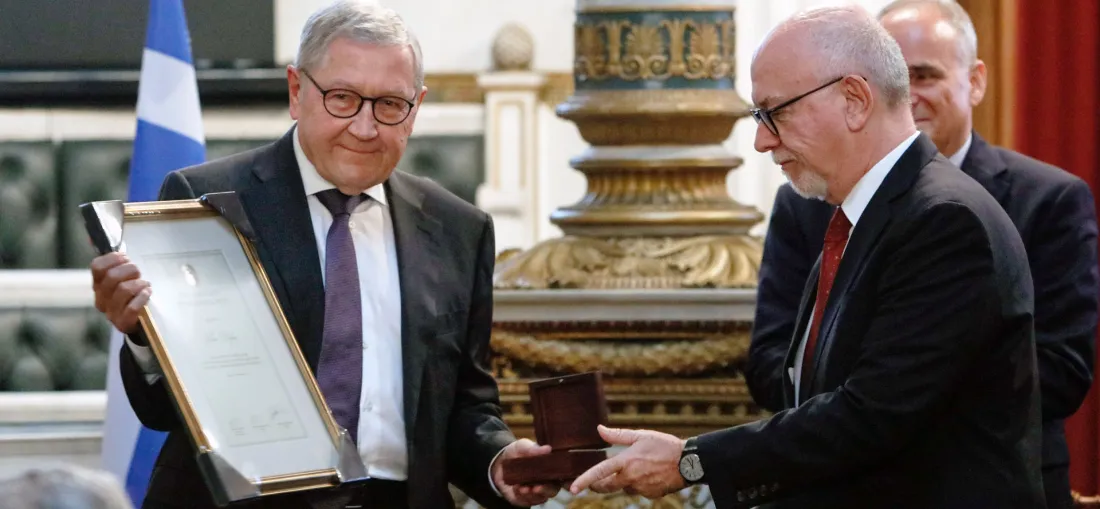Klaus Regling's speech at Lord Byron International Prize Award Ceremony

Klaus Regling, ESM Managing Director
Speech at Lord Byron International Prize Award Ceremony
Athens, 20 September 2021
(Please check against delivery)
Kalispera, good afternoon, dear ministers, excellencies, guests, and friends.
Thank you to the Society for Hellenism and Philhellenism. I feel honoured and touched to have been awarded this meaningful prize. The society has taken on the important work of preserving the Hellenic culture as a guardian of the universal values of freedom and democracy.
As we have seen during the last months, preserving the values of freedom and democracy in Europe is - again - essential.
Lord Byron captured the imagination of Europe with his poetry and personality. I too remember how passionately I felt as a student on my first trip to Greece in 1968. I have returned many times since then and still feel the same amazement. It is with the same passion that I have also dedicated most of my professional life to Europe and European integration.
During the last 40 years, I contributed to preparing the ground for our monetary union and the euro, implementing it, and later keeping the euro area intact.
As my work on safeguarding financial stability in the euro area comes to an end – my mandate at the ESM, ends in two weeks – I would like to share with you my vision for Europe, in particular, for the Economic and Monetary Union.
A vision for the Economic and Monetary Union
During my last visit to Greece in July, I was asked whether we will come out of the current crisis with a more cohesive and resilient euro area.
I believe we can.
It will, of course, depend on implementing appropriate policies and on how much further progress we are able to make in completing the architecture of our economic and monetary union.
From past crises – the euro crisis early last decade and the pandemic during the last 2.5 years – we have learned that making the monetary union more resilient pays off.
We are benefiting today from new institutions that were created in the last decade: not only the two rescue funds but also the Single Supervisory Mechanism, the Single Resolution Board, and the European Systemic Risk Board and regulatory bodies.
Solidarity measures agreed at the beginning of the pandemic, in particular the €800 billion recovery fund by the European Commission, also help now as we suffer from the economic consequences of the war in Ukraine.
To make our monetary union more resilient, its architecture should be developed further. That includes completing banking union and capital markets union. These are projects that would create a common and harmonised market for financial services.
A banking union and a capital markets union would have many benefits: a better allocation of capital across the entire euro area would boost investment, productivity, growth, and jobs—leading to greater prosperity of the European people. This is particularly important to help the euro area economy grow again after the pandemic and the war. A better functioning and more resilient monetary union would also strengthen the international role of the euro.
Beyond the euro, I believe that the EU should continue to integrate and develop. Internally, majority voting in many policy areas would make Europe more efficient as Prime minister Mario Draghi proposed. Externally we must find ways to cooperate more closely with neighboring countries.
President Macron has proposed the creation of a political union in this context. As the world order of the last 70 years is collapsing, Europe must strengthen ties with other democracies, particularly those that are geographically close to us.
A change of the EU Treaty, as recommended by the Conference on the Future of Europe earlier this year and by the President of the European Commission last week, will be needed.
I cannot speak about Europe and the Economic and Monetary Union, without mentioning a few thoughts on Greece.
A vision for Greece
Greece has been the most important and the most difficult part of my work the last twelve years. Our journey was longer than it should have been.
The Greek people had to make significant sacrifices as unsustainable imbalances, which had emerged during the previous decade, needed to be corrected. But together with our Greek counterparts, ultimately, we have always found constructive solutions. Because we never lost sight of what ultimately mattered: creating a more sustainable and prosperous future for Greece and the Greek people.
European partners have provided solidarity to Greece in form of €250 billion in loans, at very low interest rates. This has saved the Greek budget more than €80 billion in interest payments during the last decade and has put Greece on a sustainable debt path.
Due to the determination of the Greek people, Grexit was avoided, and the economy has returned to growth thanks to reforms introduced during the ESM support programmes.
But avoiding Grexit was not only in the interest of the Greek people. If Greece had left the euro area, possibly followed by one or two other members states, that would have changed the nature of our monetary union and left it much more vulnerable. Europe would be in a much weaker position today, economically, financially, and politically. We are indeed stronger together.
Greece is now on a new road towards prosperity. The ESM will stand by its side, and I wish the Greek people the very best.
Efharisto. Thank you.
Author

Contacts


